20 Under 30
Meet a group of young alumni who are bringing uncommon enthusiasm, focus and passion to their unfolding lives.
Whether as young professionals in law, medicine and government service, or budding artists who are making their way (and creating a buzz) in the filmmaking or classical music worlds, these young alumni exemplify both achievement and promise. You’ll meet social justice advocates and entrepreneurs, not to mention some serious athletes. Like all young adults, the pursuits and careers of these young Owls are works in progress. We think they’re ones to watch. BONUS: Our online issue includes six additional profiles.
Stories by Holly Beretto, Deborah Lynn Blumberg, James Costanzo, Lynn Gosnell, Sarah Brenner Jones and Kendall Schoemann

Comically Talented
Ruchir Shah ’12 is an entrepreneur, comic book author, stand-up comedian and a recent graduate of Stanford’s Graduate School of Business. His accomplishments are an intriguing blend of the technical and the creative, with a good dash of the unexpected. Ultimately, all of his endeavors prioritize learning — his work seeks to ease the process of understanding difficult concepts.
In high school, Shah started EZ Comics, a series of educational comic books aimed at making learning fun for kids. Once at Rice, he nurtured opportunities to expand this venture, working with Rice partners to bring comic books to the classroom.
At Rice, Shah took all of his interests — engineering, Earth science and politics — and put them together into a custom-built Energy Studies program. After graduation, Shah deferred his Stanford acceptance and founded Learn to Drill, a company that provides online courses and games to train oil and gas workers and whose clients include Halliburton and BP. Four years later, Shah left the business in his father’s hands and entered Stanford as a successful entrepreneur.
Shah’s next big project is in what he calls “the guidance space.” He’s developing an online “smart mirror” that uses machine learning to augment how-to videos in fields like makeup, physical therapy and dance. “Rice taught me to be comfortable taking risks,” Shah shared. “I learned that if I set a goal, there is always a way to make it happen.” — S.J.
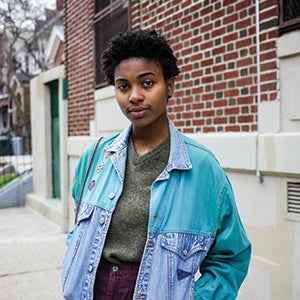
A New Narrative
I think about the hierarchy of power in film and television, in the media we consume and in the information we share,” said Paige Polk ’15, a writer and filmmaker. Polk is making a career out of an innate fascination with storytelling. A self-described quiet child who immersed herself in books, Polk’s creative career evolved through what she calls a series of fortuitous accidents and intuitive leaps.
Her studies in visual anthropology at Rice provided a foundation for confident risk-taking and experimentation. Both at the university and while studying abroad, Polk was motivated by the freedom to work with multiple forms of narrative amongst a background of people whose thinking challenged and changed her. Now, living in New York City, Polk is a graduate student in media studies at the Pratt Institute in Brooklyn.
She’s also building an impressive creative resume, including as co-creative director of the Journey Project, an interactive documentary for Google exploring race and its intersections.
Her current passion project is a web series titled “Not Yet,” written by Polk herself. Told in six episodes, “Not Yet” will explore the almost impossible idea of growing up. “Many of us imagine there is ‘one more thing’ that stands between us and genuine adulthood,” Polk explained. “I wrote about what it feels like to reach for a tangible sign that you’ve somehow arrived — you’ve grown up.” — S.J.
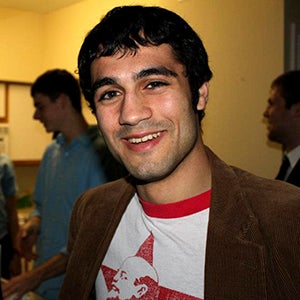
Supporting Houston’s Refugees
When he was 2 years old, Yan Digilov ’11arrived in southwest Houston from Moscow with his family amid a wave of European Jews in search of a better life. His mother, a doctor back home, picked up minimum wage jobs while learning to drive and speak English. “My family had to start all over again,” Digilov says. But they were lucky. The local Jewish community supported them, and his father soon found a job as an adjunct professor at Rice.
Digilov knows other immigrants were not — and are not — as lucky, and he’s made it his mission to help new arrivals resettle in Houston. Firestarter, the organization he founded in 2012, provides refugees with job training and job placement help and matches them with mentors. In 2017, Texas was second only to California in the number of refugees accepted for settlement; most were from Iraq, Myanmar and Congo.
“There’s a huge, huge need,” Digilov says, adding that public institutions haven’t been able to adequately help. His research shows that support for refugees fell from an average of $12,500 per capita to $3,500 since the 1980s.
Digilov, who’s also a mixed martial artist, came to the nonprofit world by way of finance. After studying economics and math at Rice, he worked for Salient Partners and eventually began managing charitable giving portfolios. At Rice, he got a taste for nonprofits by co-founding Amir, an organization that sets up farms and gardens at summer camps and trains young adults on how to cultivate change with farm and garden-based education.
Now, Digilov is focused on creating short films that highlight the challenges faced by Houston’s refugees. He’s shown two films internationally; a third, centered on Iranian immigrants, premieres this fall. Over the next five years, he hopes Firestarter’s work can be duplicated in other cities making similar investments in refugees. “That’s how this country is made,” he says, “new arrivals getting that opportunity and taking it.” — D.L.B.
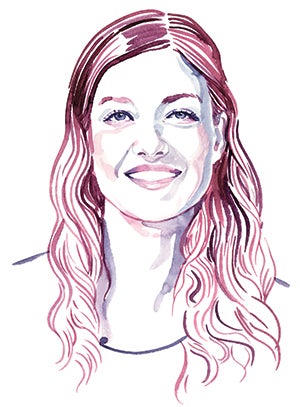
Diplomat in Training
While Rebecca Satterfield ’15 dreamed of working abroad ever since her study abroad opportunities at Rice, she never imagined she would join the U.S. Foreign Service at such a young age. She took the Foreign Service Officer Test as a senior and found out two years later that she was one of the 2–3 percent of applicants who are offered positions — and on her first attempt.
After nearly a year of Spanish and consular training in Washington, D.C., she was posted to Nuevo Laredo, Mexico, to serve as a consular officer at the U.S.-Mexico border. “It was a shock,” she said. “It’s so different than what I expected. I had been to Mexico before, but the border really is its own world.” She works in the American Citizen Services section, which issues passports and helps Americans who are in trouble. There is currently a travel advisory for Americans visiting Nuevo Laredo as the cartel violence makes it an extremely dangerous place to live.
“While it’s certainly been challenging, what I love about the Foreign Service is that I get to experience a different culture for a few years.”
The job has its difficulties, such as visiting American citizens in prison, but Satterfield focuses on the positives. “My job is to serve the American people,” she said. “One of my favorite things is to document American citizens who have never had a passport before.” After her two-year post in Mexico, she’ll complete nine months of training before moving to Riga, Latvia, for another two-year post, this time pursuing public diplomacy work. Long term, Satterfield aims to serve as a public affairs officer in Germany, representing the embassy to the media. — K.S.
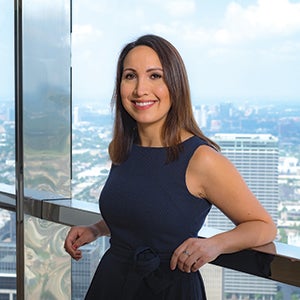
Launching a Legal Career
It was late in the day when teacher Audra Herrera ’12 got a call she’d been waiting years for. She didn’t answer. After glancing at the 617 area code, the recent college grad returned to the task at hand — leading elementary school students in math and science activities. Herrera learned she’d been admitted to Harvard Law School by voicemail.
Herrera’s dreams of a legal career began long before she walked through the Sallyport. Her parents, Denise and John, modeled the importance of service and generosity to the family. “My brother, Jonathan, and I were volunteering all the time,” said Herrera, who grew up in New Mexico. Over the years, her mom worked on behalf of victims of domestic violence and individuals with disabilities. Herrera learned that “legal advice can have a really powerful impact.”
At Rice, a college course in the then-emerging area of cyber law and cybercrime taught by attorney Rudy Ramirez ’01 would have a lasting influence in her legal studies. Herrera served as editor of the Baker Institute Student Forum’s Rice Cultivator, cheered on the Rice Owls Dance Team and played the flute in the Rice Symphonic Band.
Heeding the advice of friends and mentors, she opted to take some time off after college. Back home in Albuquerque, Herrera spearheaded a STEM-focused after-school program at her neighborhood elementary school and served as a volunteer Court Appointed Special Advocate (CASA) for two sisters in foster care. “I was really happy to be able to help the girls stay together and get adopted by their foster parents,” Herrera said.
While at Harvard, Herrera served as a legal intern for the U.S. Department of Justice’s National Security Division, tying back to her earlier interest in cyber law. As a new associate at Hunton Andrews Kurth LLP in Houston, the bulk of Herrera’s practice “involves helping cities, counties and school districts with transactional work.” But she’s also getting involved in cybersecurity and data protection issues there — another area of law that can have a really powerful impact. — L.G.
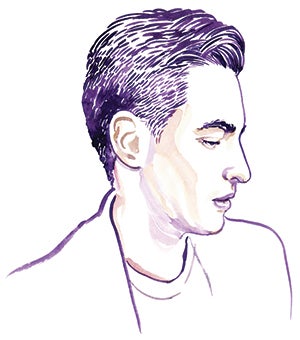
Mechanical Wizard
By day, Mike Schubert ’14 is a plant engineer at Airgas, where he oversees large-scale projects, installing new equipment, tracking production and figuring out how to make things run more efficiently. When he’s off the clock, you’ll find him on Seattle’s improv stages. And if you can’t get out to Seattle, no worries — Schubert launched a podcast a few years ago. Its subject? Harry Potter.
“It’s called ‘Potterless,’ and it’s about me discovering the ‘Harry Potter’ books,” he said. Turns out, Schubert is not a fan of fantasy novels. “I always preferred [books] where I could see myself in the situations.” Schubert cites the much-lauded children’s book “Holes” by Louis Sachar as a favorite.
Another factor in Schubert’s lack of Hogwarts knowledge: His older sister loved the “Harry Potter” books, so Schubert was against them on principle; she also loved the C.S. Lewis classic “The Lion, the Witch and the Wardrobe,” which he read on her suggestion and hated. When the series’ popularity launched J.K. Rowling into superstardom, Schubert felt that if he started reading the books, he’d just be following the herd. But when he decided to create a podcast, Schubert began looking for a popular subject that people felt passionate about. “I knew people have incredibly strong feelings about ‘Harry Potter,’ but I hadn’t read the series,” he said. “And then I knew — that’s the podcast.”
“Potterless” explores each book in chronological order. Along with invited guests (basically, his friends and fellow podcasters), Schubert unpacks the themes, characters and plotlines that define the series. He also points out any plot holes he comes across and makes various — often incorrect — predictions about what will happen next. Each book makes for multiple episodes.
As of late August, “Potterless” has 50,000 subscribers who listen regularly and 6.5 million total downloads. “I think I knew I’d love doing this,” he said about the podcast. “But I’m really surprised I love it as much as I do.” There’s someone else who loves it: Schubert’s sister, who’s excited the siblings can finally talk about the books together. “She’ll be a guest soon,” Schubert promised. — H.B.

A Submarine Life
Lt. j.g. Ricardo Marquez ’16 is working on earning his dolphins, a major milestone in the life of a young Naval officer. Wearing this gold breast pin has been a singular goal for more than two years, but it’s really the culmination of an even longer stint of training to be a submarine officer. After earning a degree in electrical engineering and completing the Navy’s famously intense Nuclear Power School, along with numerous other courses in safety and operations, Marquez will be fully trained and qualified as a submarine officer on the USS Nebraska, a ballistic missile submarine.
That’s been the goal since the day he graduated from Rice, which was incidentally the very same day he and a handful of Navy ROTC (NROTC) graduates were commissioned as officers in the U.S. Navy in a ceremony held at the Rice Memorial Chapel. “We had so many family members there,” Marquez recalled during a Face Time interview from his home on Puget Sound. By the following week, he was in San Diego “on TAD — temporary assigned duty. The military loves acronyms,” he said.
Marquez grew up in Brownsville, which he likes to describe as “350 miles south of Rice,” emphasizing the scale of Texas. As a top student, he considered going out of state for college. What sealed the deal, he said, was attending Rice’s Vision Weekend, making friends and getting to know the campus.
Unlike most of his fellow NROTC students, Marquez did not have a military career in mind when he moved into Baker College as a freshman. It was not until his sophomore year that he took a look at the campus NROTC program and decided to join. While friends complained about 10 a.m. classes, Marquez had to be at training by 5:30 a.m. “That first semester was the hardest,” he recalled. At one point, he was taking 18 hours of classes, participating in NROTC, leading projects with Engineers Without Borders and training for a half marathon. Looking back, Marquez said, it was both too much and a good learning experience “in terms of managing my schedule and all.” A fifth year on campus (courtesy of the NROTC) allowed him to complete his engineering capstone project as a member of team Five Guys and Ribeyes. In what was probably the tastiest project to come out of the Oshman Engineering Design Kitchen to date, the team developed a gradient meat thermometer.
Last April, Marquez experienced his first submarine deployment. These deployments can last up to three months. While there are work rotations built into the day, the mission is to be “on patrol 24/7,” Marquez said. “We’re always training, always sharpening the saw; the goal is to be perfect.” In fact, it’s this quality of constant learning that Marquez loves most about the service. But what about free time? When living in such close quarters, communication and hanging out with shipmates is important — especially playing cribbage, the unofficial game of submariners.
Being out of communication with friends and family — and the news — can be tough. A perfect example of this communication vacuum happened last summer when Marquez, a self-described “huge soccer fan” who has attended two World Cup tournaments, was deployed during most of the competition.
“To me, being a submariner is like being an astronaut and being on a spaceship.” Then there’s another way that life below the ocean compares to life above the Earth, and that’s in the sheer quotient of awe. There are occasions when the submarine surfaces far from land. “I remember being on the bridge and looking around and seeing the Pacific Ocean — there’s nothing around you. You can see how the Earth curves,” Marquez said. “Whenever they open the bridge hatch, there’s a gush of fresh air. Those are little things that you don’t get to experience anywhere else.” — L.G.
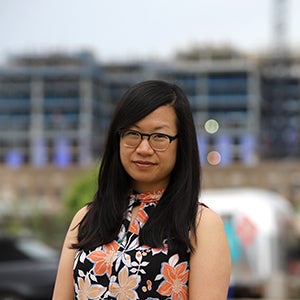
To End Human Trafficking
In her four years as a researcher at the Urban Institute’s Justice Policy Center in Washington, D.C., Lilly Yu ’14 interviewed dozens of survivors of human trafficking, policymakers and government officials. “So many survivors talked about the one person that stuck up for them and pushed for them to achieve justice,” she says. “It is possible to make really positive changes.”
As a junior staff member at the institute, Yu, who’s now a Ph.D. student at Harvard University, played a key role in several studies focused on human trafficking and the justice system. They’re studies that have the potential to inform and shape policy. The most recent one looks at how human trafficking survivors across eight U.S. cities perceive and define justice. Another focuses on runaway and homeless youth in New York City who trade sex for survival. “I very much empathize with people who make the best choices for themselves given the circumstances they’re in,” Yu says.
It’s a sentiment that comes in part from her background. Yu, who was born in China, spent the first several years of her life separated from her parents. She stayed behind in China with her grandparents while her parents immigrated to the U.S. for education. She studied sociology at Rice, where she coordinated and led an alternative spring break program her sophomore year focused on human trafficking in Houston. The summer before her senior year, she landed an internship at the Urban Institute. At Harvard, she’s studying sociology and social policy and is already looking forward to the day when she’ll be able to design and lead her own sociological studies. “I really love research,” she says. “Its ability to illuminate things for people, to create larger social change.” — D.L.B.
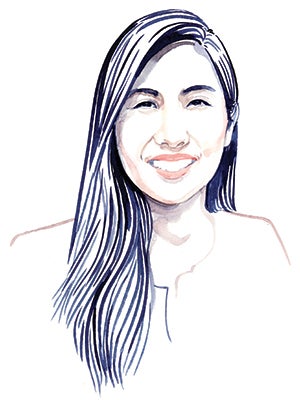
At the Front Door of the White House
Melissa Fwu ’12 remembers visiting Washington, D.C., as a child and wondering what happens inside the White House. Now as a White House employee, she no longer wonders. “As a daughter of two immigrants, working in the White House is a dream come true for me,” she said. “I feel like I’m living the American dream — it’s a privilege to serve the American people and work alongside some truly talented and passionate individuals.
Fwu first delved into politics by hunting down her local state representative, whom she worked for until the end of the Texas Legislature session. After that, she spent two years with the Republican Party of Texas as the very first director for Asian-American engagement doing coalitions work. Two years ahead of the 2016 presidential election, she joined the Republican National Committee in Virginia as a regional director and worked her way up to deputy state director. Fwu is now an associate director in the Office of Public Liaison, one of the White House’s external-facing units. “We are the front door of the White House so to speak,” she said. “We work with stakeholders and community groups to amplify and advocate for the president’s policies.”
With a portfolio focused on trade, financial services, foreign affairs, and the Asian American Pacific Islander community, Fwu goes from briefing community and business leaders one day to coordinating a Presidential event on tax reform the next. A lot of people ask her if she has future plans to run for office. “I don’t think so,” she said. “I really love public policy — to be able to create policies that improve people’s lives. I hope to continue to have a role that advocates for positive change.” — K.S.

Gateways to Success
Quick-witted and engaging, James Carter ’17 is all charm backed up by a razor-sharp intellect. He is passionate about understanding the way diversity functions in the workplace, and he has a goal, a plan, and the tenacity and talent to pursue it. In fact, Carter has been planning, working and seeking opportunity since youth. As a sixth grader, he became involved with Breakthrough Central Texas, a nonprofit that helps children from low-income communities build a path to college. By high school, Carter, with Breakthrough’s help, landed a coveted spot at a private boarding school in Austin. Looking back, he remembered, “Boarding school was a great college prep experience, but it also prompted a lot of questions. I became focused on studying income and racial inequality.”
At Rice, Carter started research in Mikki Hebl’s psychology lab as a freshman, delving into diversity and discrimination in organizations. He took advantage of every research opportunity that came his way, working with English professors, the Gateway Study of Leadership and completing a psychology undergraduate honors thesis. In each instance, Carter was solidifying his research interest in diversity in organizations, intersectionality, social mobility and leadership.
Carter is now a Ph.D. student in management at the Columbia Business School where he’s involved in a number of projects that seek to understand the psychological mechanisms that influence how people recognize and interact with diversity and intergroup relations.
“I’m interested in social mobility, how people from low-income or first generation backgrounds navigate spaces where they are not the norm,” Carter explained. His goal is to teach at a research university, but he is also committed to giving back to educational opportunity organizations and offering other kids the vision and means to pursue their dreams. — S.J.

Walking Life
I was persuaded by two friends at Rice to try a half-marathon,” remembered Arindam Sarkar ’11 of his undergraduate days. Enjoying the camaraderie and physical benefits of running, he stuck with his new hobby through medical school at Baylor College of Medicine. When he became a volunteer for United in Stride, an organization that provides marathon trainers for people who are blind or visually impaired, he realized that combining his passion for service and exercise was key to his own sense of fulfillment.
Most recently, Sarkar started a Walk With a Doc program at T.C. Jester Park, close to the Northwest Health Center where he’s doing his residency in family and community medicine. The first Saturday of each month, Sarkar and his colleagues offer a quick wellness lecture and join patients and friends for a 2-mile walk. Participants ask medical questions ranging from eating habits to complex medical concerns.
“Not only am I doing something that helps me to be fulfilled and healthy, but I can also see how this work is making an impact on the lives of others.”
After residency, Sarkar plans on continuing as a primary care physician in Houston. His work with the Harris Health System has afforded him a broad and comprehensive patient base, which has helped him to appreciate the diversity of Houston. “I’m incredibly enthusiastic about the process of listening to patients talk about their lives and needs,” Sarkar explained. — S.J.
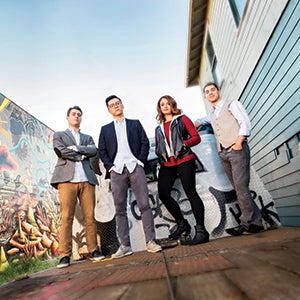
Sound Masters
The world sat up and took notice of the four chamber music upstarts who swept the 2013 Banff International String Quartet Competition. The Dover Quartet would, in short order, go on to win the Avery Fisher Career Grant and be named a Cleveland Quartet Award winner.
But before they were any of those things, they were two pairs of undergraduates at the Curtis Institute of Music. Milena Pajaro-van de Stadt, the quartet’s violist, and Camden Shaw, its cellist, met during their first week at Curtis. Violinists Bryan Lee and Joel Link had known each other since they were 13. The group came together in 2008 and they all earned master’s degrees at Rice’s Shepherd School of Music in 2013.
The group averages about 130 concerts every year. During the 2018–2019 concert season, they are playing in Portland, San Francisco and Hong Kong, among dozens of other cities. (Next spring, they’ll be back on campus with a program called “Love Stories,” featuring works by Anton Webern, Alban Berg and Robert Schumann.) When we talked to them for this story, they were huddled around Shaw’s cellphone in a hotel room in Norway
“People assume [the life of a musician] is glamorous and amazing,” laughed Pajaro-van de Stadt. “It’s always amazing to be doing what you love, but a lot of days, it involves brutally early mornings and crossing through three or four time zones, then rehearsing and playing. But if you want to sustain this career, you can’t be in one place.”
The group is in agreement that they love the intimacy that comes from being a quartet, both as fellow musicians and for the bonds audiences can create with them and the music they play. There’s an energy created that can be both powerful and up close in a way that is different from symphonies and selections scored for much larger groups.
The Dover Quartet has become known for its precision and passion. They’ve been called a “must-hear” by The Washington Post, and “the young American string quartet of the moment” by The New Yorker. If it seems a lot to take in from the outside, this ensemble takes it in stride, knowing that they’re doing all they ever wanted to do: play music. — H.B.
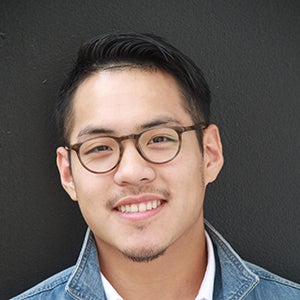
Powered by Batteries — and Lightsabers
From smartphones to power tools to Teslas, lithium-ion batteries are everywhere. Yet, their charging time has stagnated, they degrade over time, and they’re expensive. Adrian Yao ’14 is working to change that. Since graduation, Yao has been hard at work developing new designs for the electrodes inside lithium-ion batteries. The cross-section of an electrode looks like a spongy cake. “We’re building fancier cakes,” Yao says, ones that can charge batteries faster and at a lower temperature, and that live much longer.
His company, EnPower, Inc., is in the midst of raising $6 million in Series B funding and relocating to Phoenix from its current base in Chattanooga, Tenn. Yao, the son of an architect and a designer, studied materials engineering at Rice, then founded EnPower’s predecessor, Big Delta Systems, along with fellow Rice graduates Charudatta Galande ’13 and Neelam Singh ’14. The trio launched the startup through Rice’s OwlSpark accelerator, working out of a windowless U-Haul warehouse in downtown Houston.
Their efforts got the attention of fellow Rice alums Michael Kane ’83 and Clint Carlson ’79 who along with 20 other investors kicked in $1 million in seed funding. “Adrian reminds me of the Matt Damon character in ‘The Martian’,” said Carlson, who heads Carlson Capital in Dallas. “No matter what problems are thrown his way, his deep knowledge, resourcefulness and tenacity allow him to quickly overcome and persevere.”
The investment allowed the team to create a lab at Johnson Space Center before Yao moved the company to Chattanooga. “We’ve been able to show significant improvements in charging a battery faster,” Yao says.
Yao and EnPower CEO Houstonian Annette Finsterbusch have and are continuing to create a strong patent portfolio around the designs. The plan is to license the technology to companies across industries. “This is the logical next generation of lithium ion,” says Yao. Like many entrepreneurs, Yao isn’t a one-trick pony. In his spare time, he paints, sings, and makes and sells his own lightsabers.
“A lot of people out there are Star Wars nerds,” he says, “me included.”— D.L.B.
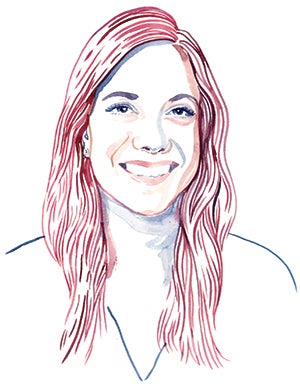
Healthy Collaboration
Ellory Monks ’12 double majored in civil and environmental engineering and policy studies because she wanted to use engineering as a springboard for creating a more sustainable world. In 2016, she co-founded her own company, The Atlas Marketplace, an online community where cities share their success stories, learn what’s working in other cities and build relationships with partners who can help.
“More than 1,500 city officials visit the site every month and we have 100 partner cities now,” Monks said. “And while we do work with big cities, our partners are mostly medium-sized cities — like Gary, Ind., or Providence, R.I.” For example, via Atlas, city leaders in Providence connected with startup companies that test and analyze lead in drinking water and help find ways to replace ageing systems more efficiently without breaking the bank. “You learn so much about yourself when you’re building a business. One of the most important things is having colleagues who share a vision of what our company can and should do.”
Monks matriculated at Rice just as Hurricane Ike slammed into Houston. The storm’s impact would spur the launching of Rice’s Severe Storm Prediction, Education and Evacuation from Disasters (SSPEED) Center. But before the center was even up and running, she interned for SSPEED co-director Jim Blackburn and took classes in resilience with Phil Bedient. Following graduation, Monks headed to Washington, D.C., for a fellowship with the Science and Technology Policy Institute, where she advised the Obama administration’s White House Office of Science and Technology Policy on a wide range of infrastructure, climate and resilience issues.
Now based in San Diego, she and husband Sean Monks ’08 (until recently, an active duty U.S. Marine Corps officer, now a lawyer and serving in the Reserve) spend as much time in nature as possible — hiking with their dog, shopping at farmers markets, gardening and cooking. For Monks, outdoor hobbies are about connecting to her community and to the natural world, activities that, in turn, inspire her work. “At its core, it’s about being in pursuit of a bigger vision.” — H.B.
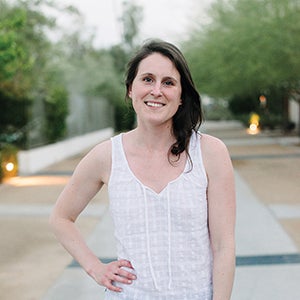
Wild Heart
Among 2010 graduate Ashley Thompson’s achievements — earning an architecture degree from Rice and a master’s in design studies from Harvard as well as being a U.S. Air Force officer — there is a wildness, a penchant to explore new territory and forge paths less traveled.
As an Air Force officer, Thompson served three years as a civil engineer in Japan. Now, she intersperses Air Force contract work in Germany with world travel as she moves from peak to peak during mountaineering season.
An endurance athlete and an avowed outdoor enthusiast, she began doing excursions into the wilderness in her early 20s, but more recently she has dedicated her free time to months-long mountain climbing adventures. A year ago, she took on her first big climb at Mount Rainier. This year she hiked Mount Kilimanjaro, spent a month in the Everest Region of Nepal to summit Island Peak and was back on Rainier working on a more technical route. Next year, she has set her sights on Denali, the highest peak in North America. Academically, professionally and personally, Thompson is driven to push for political, social and environmental equity. Her graduate work at the Harvard Graduate School of Design focused on social equity and gender inclusion. Following the Gorkha earthquake in 2015, Thompson launched fieldwork in Kathmandu that promoted relief and resiliency efforts via community partnerships and locally based innovations, concentrating on projects that included and empowered women.
“In all of the work that I’m doing,” Thompson explained, “I’m interested in reasserting the perspectives and stories of people who are present, working and achieving, but who aren’t necessarily heard. I’m interested in changing who controls the narrative.” — S.J.
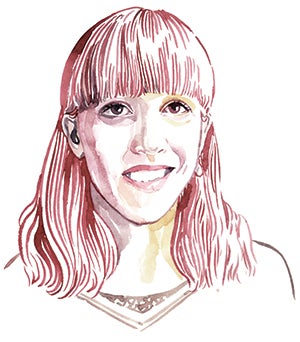
On The Record
Rice seemed like a place where you could be yourself,” said Rose Cahalan ’10, managing editor of The Texas Observer, about her first impression of the campus. When she arrived on campus in fall 2006, she was drawn to English classes. With parents who were both English professors, it was a case of the apple not falling far from the tree.
But unlike her parents, Cahalan’s experience would lead her to the newsroom instead of the classroom. Her first internship, which would also be her first journalism job, was with My Table magazine, a now-digital publication exploring Houston’s ever-growing food and restaurant scene.
Cahalan calls her road to professional journalism “a meandering path,” one that took her first to the University of Texas at Austin alumni magazine, the Alcalde, and through several overlapping freelance assignments before she landed at The Texas Observer in 2016.
“The Observer is one of a kind,” she said. “We’re a small team. I really get to do some of everything. And our publication takes an unapologetically progressive point of view on social justice issues. It sounds cheesy and idealistic, but I love being able to tell stories that can make a difference.”
Cahalan keenly feels the responsibility she has to her readers, as well as to those who share their stories with her. Whether she’s writing a film review about a documentary that focuses on a strike in Texas in 1938 or a profile about the best places for raspas in South Texas, she hews to a personal code of taking every story seriously, even if it might seem like lighthearted fare.
Her path to journalism may not have been traditional, and she’s fine with that. “Reading long, complicated articles for class and having to discuss them has shaped me and the way I approach my own writing.” Cahalan is a fan of long-form stories — 2,000–3,000 words — a length that allows her to really open up on a subject. “Writing,” she said, “allows me to have an adventure every time I set out on a new story.” — H.B.
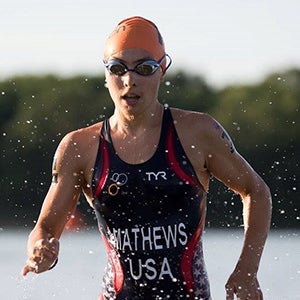
Triathlete in Training
After a 1.2-mile swim in the Nelson Mandela Bay, Laura Mathews ’17 jumped on her bike, powered through a 56-mile ride, then took off on a 13.1-mile run. This is how she celebrated her 25th birthday, at the 2018 Ironman 70.3 World Championships in South Africa. Mathews was one of only 50 top female professional triathletes in the world to compete.
“It was really exciting to get to go and race the amazing athletes I’ve been watching for years,” she said. As a professional triathlete who focuses on half-Ironman races, Mathews spends her days training in swimming, biking and running. It’s a sport that requires focus, determination and stamina. It’s also one she fell into by chance.
“When I was 10 or 11, I would get up every day at 5 a.m. to go swim at the gym with my dad,” she said. Soon after, she joined a competitive swim team, then, years later won a swim scholarship to Pittsburgh’s Duquesne University. When the swim season was over, she ran and biked to stay in shape.
On a whim, she signed up for a local triathlon. Even on her father’s bicycle, which was too big for her, and lacking basic gear like a race belt, she placed third in her age group, qualifying for the national championships. From there, she qualified for Team USA and a spot at the world championships. After a year at Duquesne — Pittsburgh was too cold — she transferred to Rice, where she studied ecology and evolutionary biology.
Since then, she’s dedicated herself to the sport full time. Now, she’s back in her home town of Memphis. What is it about triathlons that keeps her going? “I get to travel to a lot to places I certainly never imagined going to,” Mathews says. “You definitely have to be disciplined to be a professional. I also just love it!” — D.L.B.

Yoga Life
Alicia Dugar Stephenson ’12 was one year into her engineering major when a lupus diagnosis forced her to change direction. “I needed a major that made me happy and less stressed,” she said. “Luckily, I found something I enjoyed much more.” She chose French, a subject she enjoyed in high school, and international affairs. These passions led to a study abroad stint at L’Université de Nice in France during her junior year and to the French island of Martinique, where she spent a year teaching English after graduation.
When she returned to the States, she was introduced to yoga by chance when her sister passed along a week’s worth of yoga classes. “Practicing yoga changed my life,” she said. “It was my way of enjoying every day. I practiced all the time and signed up for the first available teacher training.”
Yoga minimizes Stephenson’s lupus symptoms, an autoimmune disease that causes pain and inflammation. “Yoga helped me heal myself,” she said. “That’s why I teach — I’m paying it forward.”
She became a teacher at YogaWorks, a network of studios, and worked her way up to part of the leadership team. She also has her own company, AfroYoga International, which hosts yoga retreats and online wellness courses, and she is on the executive committee of The Melanin Project, a nonprofit that connects traditionally marginalized communities to emotional wellness. In October, Stephenson is releasing her first self-help book, “Yoga Wife, Happy Life,” which details the role her yoga practice plays in her personal life. She sees several parallels between her education and career path. “Everyone has their own life journey,” she said. “Diplomacy is taking all that diversity and helping people reach a common goal. That’s what I do through yoga.” — K.S.
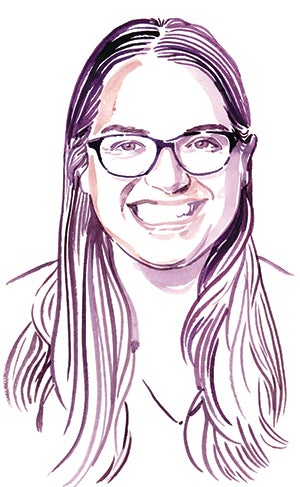
Global Inspiration
As a Rice undergrad, Lila Kerr ’12 spent her summers abroad testing student-designed medical equipment with Rice 360° Institute for Global Health. She studied sociology and the root causes of disparities in health outcomes, and she began to engage the incredible complexity of finding solutions to global health challenges.
Now a graduate student at Yale in a joint master’s in public health and business administration, Kerr has increasingly become interested in how organizational behavior relates to global health. As an intern with Sanergy last summer, she focused on the sanitation crisis in Nairobi, Kenya. Her team aimed to make staffing for their container-based sanitation model more cost efficient — ultimately providing toilets, waste removal and recycling for thousands in the capital city’s informal settlements.
“The difficulty I keep seeing is organizational in nature,” Kerr explained. “How can local leadership and doctors access sufficient energy sources? How will they address staffing shortages? What about transportation networks? These questions have motivated me to look at public health through an operational lens.”
Kerr is walking in distinguished footprints. She’s quick to credit her success to the talented women who first taught her about global health. “I am so appreciative of the number and quality of female mentors I had while at Rice,” Kerr said. “I feel so lucky to have been guided and taught by them.” — S.J.
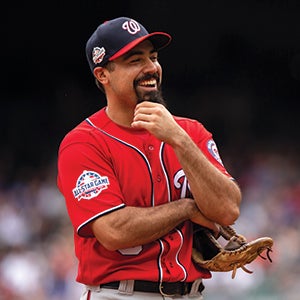
A Major Major Leaguer
Even on his best day, Anthony Rendon ’12 would rather not talk about himself. Early last season, the notoriously unassuming Washington Nationals third baseman and former Rice Owl went 6-for-6 with three home runs and 10 RBIs, leading his team to an 18-run victory. At the time, he was just the second person in baseball history to do so.
Afterward, media members approached him with caution. “You don’t like talking about yourself, but I’m going to have to do this to you,” a reporter prefaced, wanting something, anything, out of Rendon on his historic day. Rendon deflected all questions, maneuvering a piece of bubble gum around his mouth while talking up his team’s pitching performance. Politely exasperated, the reporter asked: “Can I do anything to get you to comment on your offensive day today?” “No,” said Rendon, a sly smile creeping across his face.
The Washington Post once wrote that Rendon “actively avoids attention” and remains “playfully evasive.” “I credit that to my parents. Growing up, they taught me to be humble,” he said. Allow us, then, to brag on his behalf.
In six seasons, Rendon has finished in the top six in National League MVP voting twice. He won NL Comeback Player of the Year in 2016 and is regarded as one of the best defensive third basemen in the game. This season, he finished in the top three on the Nationals in every major offensive category, leading the team in both batting average and doubles. Meanwhile, he and his wife, Amanda, celebrated the birth of their first child, Emma, in July.
While at Rice, Rendon was Baseball America’s Freshman of the Year and the Dick Howser Trophy winner for the nation’s best player — among many other accolades. Coach Wayne Graham once compared his wrists to those of Hank Aaron and his hand-eye coordination to Brooks Robinson’s.
It’s the competiveness and complexity of baseball, in fact, that inevitably drew him to the sport. “There are so many little games within the bigger game of baseball. There are a lot of little things that have to go together as a team to get you pulling in the same direction to get a win,” he said. “You really can’t have just one individual take over the whole game for a team. One person can’t score 10 runs by themselves, they can’t drive themselves in 10 times.” He paused and chuckled, knowing the inevitable question to come. “I guess I set myself up there.” — J.C.

Baking by the Numbers
Erika Kwee ’12 leads two lives. In one, she’s a product manager for HP Inc., and in another, far more delicious life, she’s the creative mind behind The Pancake Princess, a data-driven baking blog.
Kwee started her blog when she had a lot of free time to pursue a hobby after graduation. She said the food genre was sparked by her self-proclaimed sweet tooth and her passions for baking and recipe hunting. A blogging novice at the time, she gave herself a crash course in coding, food photography and branding. “I find it really rewarding when people tell me my research helped them bake the perfect cake for a special event,” she said. “There’s nothing worse than trying a new recipe and having it flop at the last minute.”
In a saturated sea of food bloggers, Kwee’s signature bake-off posts make her stand out. The bake-offs, which are loved by her more than 21,000 Instagram followers, consist of 12 or so curated recipes of the same genre, such as “best brownie.” The thorough methodology includes a slew of lucky friends who are invited to taste test and rank.
Kwee compiles the results into a data visualization, including scatter plots, bar charts and graphs, an overall ranking and a breakdown of subcategory awards, such as “best cake for least effort” and “most effort for best payoff.” While Kwee doesn’t strive to blog full time, she hopes to use her experience to launch a business that blends food and sustainability. “I feel like I plan bake-offs like people plan vacations.” — K.S.
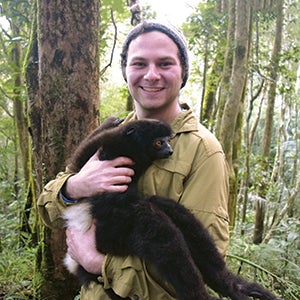
Will Write for Science
An animal lover for as long as he can remember, Jake Krauss ’17 had a lightbulb moment in his freshman-year conservation biology class. “I learned that conservation was something that could be studied and helps save endangered species,” he said. “I took advantage of every research opportunity I could find to get involved in conservation-based research and fieldwork in general.” This passionate drive took him all over the world while at Rice — from Ecuador to Madagascar to Australia.
After graduation, he was awarded a Wagoner Foreign Study Scholarship that allowed him to work in Peru for a couple of months. He collaborated with an environmental nonprofit near Machu Picchu on a community-based ecotourism project focused on a group of birds called the Andean cock-of-the-rock. “The birds are really interesting to tourists because of their mating display,” he said. “The males will dance around and perform to attract the attention of the females.” Krauss and his brother, who is a cinematographer, teamed up to produce a short film about the birds. “We spliced together footage of the birds dancing with people from Cusco dancing, and it created this nice imagery that links the people with the environment.”
After his Wagoner fellowship, Krauss backpacked through Bolivia and Chile before returning home to Washington, D.C. There, he worked as a science writer at the National Environmental Education Foundation, focusing on environmental marine life issues. “It’s been a great experience to communicate science to the general public,” Krauss said. “I’m passionate about improving scientific literacy and hope to incorporate that into my career.” This year, Krauss embarks on doctoral studies at the University of New South Wales in Sydney, Australia, focusing on conservation biology. His research will study the reintroduction of several types of marsupials to a mountain forest. — K.S.
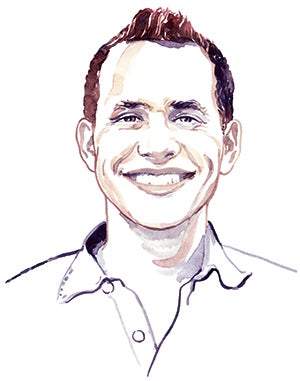
A Coaching Teacher
Andrew McDermott ’10 came to Rice as a history major. But sometime during his junior year, he realized that using history as a launch pad to law or politics wasn’t for him. So, instead of going to graduate school after commencement, he applied for Teach for America. “Teaching runs in the family,” he said. “My mom is a teacher. My sister’s a teacher. I have aunts and uncles who teach.”
More than that, though, he liked that Teach for America wanted to address inequities in the classroom by placing graduates from top colleges like him in rural or urban schools. As a young teacher, McDermott loved being around students. He taught seventh and eighth grade history. Today, he’s the assistant principal at KIPP Liberation College Preparatory in Houston.
“When you’re a classroom teacher, you mostly deal with students and their parents,” he said. “Now, I spend my days with students, parents and teachers, trying to find ways to help them succeed and making sure we’re creating an environment that works for everyone.” Throughout his time as an educator, McDermott has wanted to be sure that his students not only saw themselves in the subject matter, but also understood that they could graduate and go on to college. Helping them find that path to success is something he also hopes to show teachers at KIPP.
“I want to be an instructional coach to them,” he said. “I really didn’t want to be a typical administrator.” McDermott served as president of Jones College and took part in Impact Rice, a leadership development program for freshmen and sophomores. “The best part of my day are those moments — and this happens for both teachers and the students — when you see their minds grow, when you realize the thing you’ve been working on with them really clicks. I love that.” — H.B.

Engineering Change
At Rice, Gabe Baker, ‘14 majored in civil and environmental engineering, played in a record-breaking 56 football games and occasionally found time to keep up his cello skills. With the goal of learning more about civil engineering careers, he interned with Harris County Judge Ed Emmett’s ’71 office. After college, he worked as a roadway engineer for HNTB Corporation, an engineering and construction management firm in Houston. So, when Emmett’s office called last spring, asking if he’d be interested in becoming a flood control policy adviser, it seemed like a job tailor-made for Baker.
“It’s purposeful work,” said Baker about his new position. It’s not just that he sees a duty to his community to serve, but that he sees doing so as an extension of his deep Christian faith. Baker recently completed his Master of Theological Studies at the Houston Graduate School of Theology (HGST), something he long felt called to do.
“My foundation was a spiritual Christian household,” said Baker, whose mother teaches at HGST. “And my studies gave me an incredible understanding of where people are coming from, philosophically and spiritually.”
Baker’s faith drives him to create community, something he thinks his position helps him to do. “There’s a deeper motivation for me in my career than just advancing to another job,” Baker said. Shortly after he was hired by Emmett, he spent time traveling around Houston, talking about the bond measure that would raise $2.5 billion for flood control efforts. His Rice studies allowed him to understand the scope of the projects involved — everything from property buybacks to shoring up reservoirs — but it was his seminary training, he said, that helped him connect with the people whose lives were affected by Hurricane Harvey. “For those who lost their homes, flood control isn’t theoretical,” he said. “This is a real issue in their real lives. Something needs to be done in our region. Being able to speak to people and tune in to their needs is useful.” — H.B.
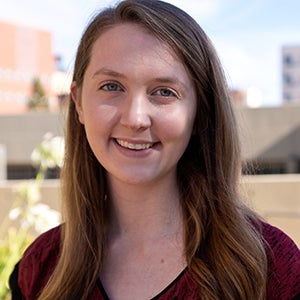
Tools for Healing
Early cancer detection, malaria testing, epilepsy: Sarah Hooper ’17 is using her electrical engineering and computer science know-how to help find solutions to some of the world’s most pressing health issues. Most recently, Hooper wrapped up a 12-week internship at the Bill and Melinda Gates Foundation, where she explored and evaluated other ways to test for malaria besides the standard finger prick blood test. “A lot of people have malaria and don’t have symptoms,” she says, “but they can continue transmitting to other people.” Those patients prefer not to have blood taken, because they don’t feel sick.
One possible alternative to finger pricking is a device that detects the disease using a beam of light shined onto a patient’s skin. The light reveals changes in the red blood cells underneath. It’s a tool with the potential to multiply the number of people screened for the deadly disease. Hooper’s back at Stanford this fall, where she’s earning her Ph.D. in electrical engineering, courtesy of the prestigious 2018 Fannie and John Hertz Foundation Graduate Fellowship for graduate education.
One area she’s focused on in cancer research is machine learning. Currently, to diagnose cancer, radiologists will typically evaluate a medical image such as an MRI or a PET scan and then physicians will monitor patients during treatment. “Potentially, you can teach a computer to do the same thing,” Hooper says. At Rice, Hooper minored in global health technologies, and through the Rice 360° Institute for Global Health, worked with a team to create a low-cost device that helps prevent hypothermia in newborns with respiratory distress syndrome. She also helped develop an algorithm to predict seizures, a potential life-line for the nearly 1 million epilepsy patients in the U.S. who don’t respond well to antiseizure medication.
Her work has taken her across the globe. While at Rice, she spent a summer in Malawi, partnering with local university students to design low-cost medical devices. “It was rewarding and motivating,” she says. “I’m in a place now where I feel like I can really contribute something,” Hooper adds. “I’m very driven by impact.”— D.L.B.
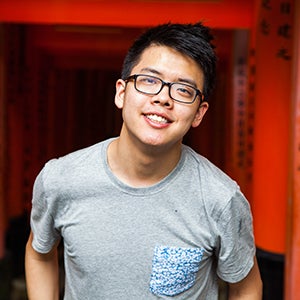
Picture of Health
Nathan Liu ’14 has a solution for medical school students struggling to remember the myriad symptoms associated with different diseases: visual mnemonics. Through the company he co-founded, Pixorize, Liu and his partners make creative images to help complicated topics stick.
For example, one image depicts a girl looking longingly at the planet Mars — she’s a fan of Mars or a “Marfan” — and she lifts her eye glasses to symbolize a dislocated lens. The lesson: patients with Marfan syndrome experience an upward movement of the lens in their eyes. It’s an unusual way to memorize facts, but it works, says Liu. “Most people are visual learners,” he says.” Liu, for one, would know. He spent three years in medical school at Cornell before taking a hiatus to focus full time on Pixorize.
“It started off as a side project,” he says. “We really built it as way to help ourselves study.” But then, the company rapidly grew. Pixorize also makes history-related images for students in grades K–12 and offers a free annotation tool that anyone can use to add labels to images, from an X-ray to a family portrait. Liu also co-founded a nonprofit called Future of Care, a group of young entrepreneurs, clinicians and scientists bringing technological innovation to medicine.
At Rice, Liu studied engineering and minored in global health. After graduation, a Fulbright scholarship took him to London, where he earned his master’s degree in translational medicine, a field that marries engineering and medicine. “I’ve always wanted to work with tech,” he says. “I’ve always been a thinker.” He entered medical school to get a better grasp of the problems doctors and patients face, and how to innovate to solve them. “It’s an untraditional path,” Liu admits, but one he hopes will bear fruit. “You want your work to mean something to someone else,” he said, “and to help others.”— D.L.B.
